- English
- Philippines(PHP ₱)
No relevant currency found



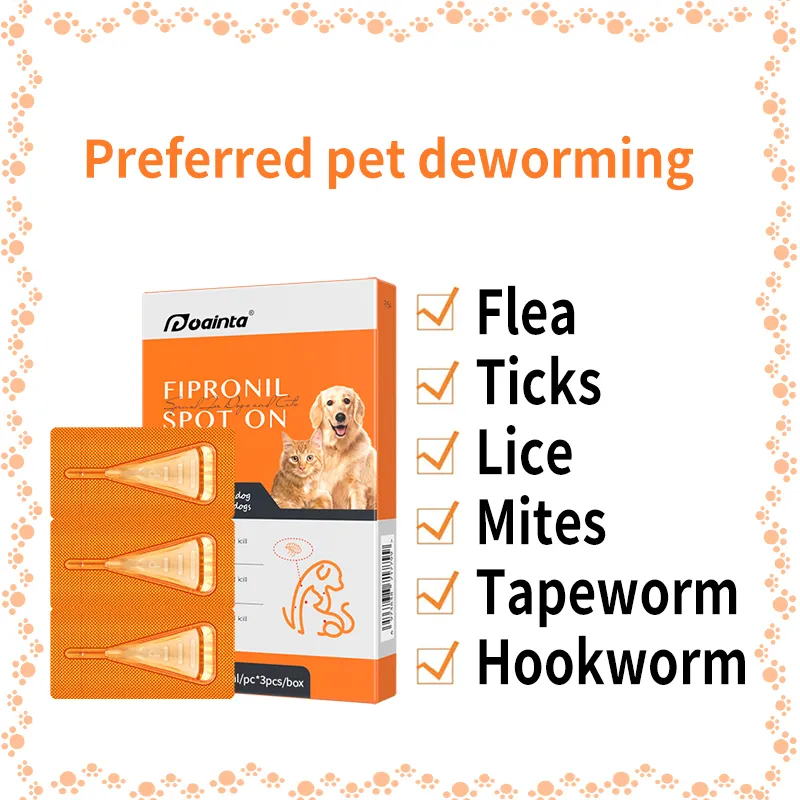












































All-round Dewormer Set (Flea & Tick Spot On+Dewormer Tablets)




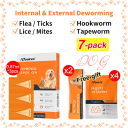
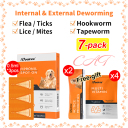
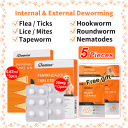
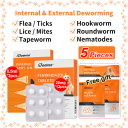
Fipronil Spot On
Details
The active ingredient fipronil rapidly dissolves into the skin’s natural oils your pet and feathers, spreads over the entire surface of the body within 24 hours, and is concentrated in the oil glands of the skin to form a cistern/reservoir.
Fipronil is then secreted by the natural oils from the skin and fur, diterusin to your pet’s skin layers and furs for several weeks after application.
Bathing is not allowed within two days before and after applying the product. Best use it 3 days after showering your pet and keep it away from getting wet, as the formula needs time to spread and activate from under the skin of the whole body.
Effectively kills, controls and prevents infestations of adult fleas prior to egg-laying.
Effective against fleas that cause flea allergy dermatitis as well as brown dog ticks, American dog ticks, lone star ticks and deer ticks that may carry Lyme disease, when used as directed.
Ingredients
Fipronil
How to use
| Usage and Dosage | ||
| Weight(kg) | Coated parts | Dosage |
| Under 10 | The neck at 3 | 1 tube |
| 10-20 | 5 on neck and back | 2 tube |
| 20-40 | Neck, back 5 and forelimbs under armpits | 4 tube |
| Over 40 | Neck, back 5 and forelimbs under armpits | 6 tube |
Tips: Do not take it internally, avoid dripping into pet's eyes. Do not contact with pet owner's skin directly. Do not apply it on puppies and kittens under 8 weeks. Do not bathe for two days before and after applying. Applying once every month for flea-infected areas.



Fenbendazole Dewormer Tablets
Fenbendazole (often abbreviated FBZ) is used in both large and small animals. In dogs, it is useful against roundworms, hookworms, and the more difficult-to-treat whipworms. It is effective against the Taenia species of tapeworm. It is also effective against Giardia (an intestinal protozoan that causes diarrhea) as well as several species of lungworm and even some flukes.
When a pet has chronic diarrhea and a cause cannot be found through testing, it is common to give fenbendazole for several days in a row as a general broad-spectrum dewormer; the idea is that most parasites of significance will be removed by it even if they escaped detection in testing.
Discovering worms in your dog’s/cat's feces or poop bag usually isn’t a fun experience. Tapeworms can cause lethargy, coughing, vomiting and other signs of sickness. You’ll want to remedy the situation as soon as possible to help avoid more serious illnesses. Thankfully, Puainta Tapeworm Dewormer for Dogs provides a simple, over-the-counter solution to help remove worms in puppies and adult dogs. Chewable deworming medicine for dogs helps eliminate the most common forms of tapeworms—Dipylidium caninum and Taenia taeniaeformis.
Details
- Effective deworming, esp. the parasites inside pet’s body, including roundworm, tapeworm, nematode, hookworm, whipworm, trichinella.
- Removes common tapeworm.
- Schistosoma lung is a parasitic organism called trematode, which is quite common in dogs in North America and is called Paragonimus kellicotti. Fenbendazole is widely used to treat this infection.
- Puainta® Fenbendazole Anthelmintic tablets will remove the common tapeworms, Dipylidium caninum and Taenia taeniaeformis, from dogs and puppies.
Ingredients
Fenbendazole
How to use









